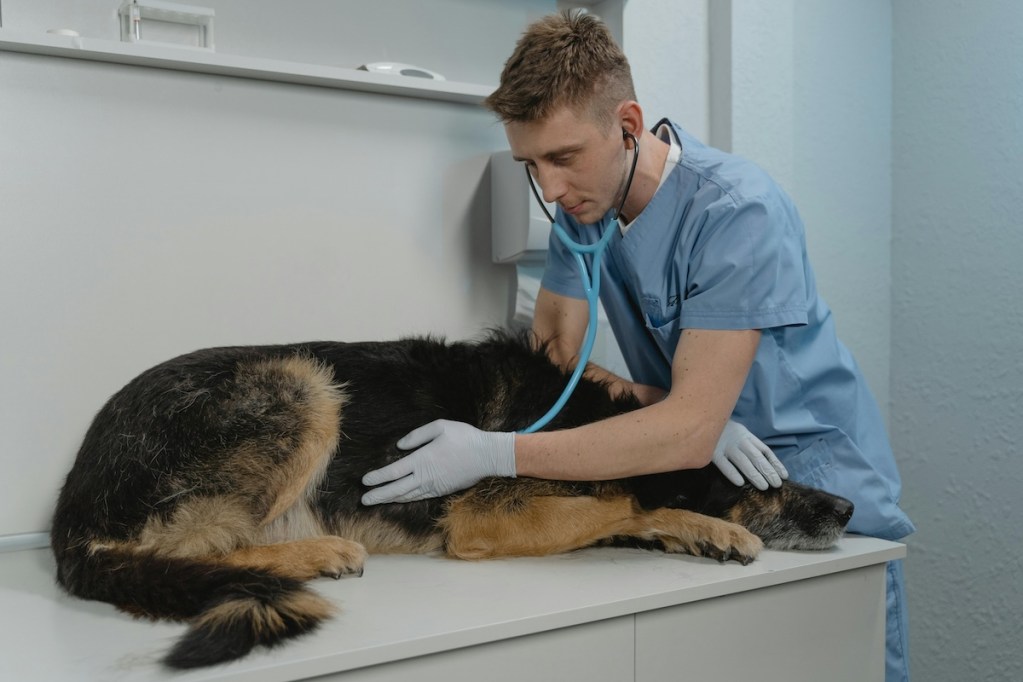
Witnessing a seizure can be jarring, especially if you never have before. You may feel scared and helpless if the person is a stranger at a restaurant or a friend or family member. What if that friend or family member is of the furry variety? The experience can take on new layers — you’re supposed to care for and help a dog, but you have no idea what to do.
Your best bet is to call the vet if your dog has never had a seizure. Should the veterinarian’s office be closed, an emergency hospital is equipped to handle seizures in dogs. If your dog is prone to seizures, your vet likely gave you instructions on what to do — follow them. However, perhaps you’re in the lobby waiting for answers, trying to make sense of what happened. Alternatively, maybe you’re a pet parent-to-be who wants to be prepared for anything and everything. This guide to seizures in dogs can help.

What causes dog seizures?
Seizures are the most common neurological condition in dogs. However, that doesn’t mean seizures in dogs are “normal.” There are various causes for seizures in dogs, including:
- Epilepsy (an inherited disorder with an unknown cause)
- Liver disease
- Kidney failure
- Head trauma
- Low blood sugar
- Ingesting something toxic, like lead or antifreeze
- Heatstroke
Additionally, certain breeds are more prone to seizures, likely due to genetics. While any breed of dog can experience a seizure, ones more likely to have one include:
- Basset hounds
- Dachshunds
- Australian shepherds
- Schnauzers
- Irish setters
- Labrador retrievers
- Golden retrievers
- Poodles
If you’re getting a dog from a breeder, ask whether seizures run in the bloodline. A reputable breeder will have this information handy. If the breeder does not have these insights or whiffs at the question, consider that a red flag to take your search for a pet elsewhere — good breeders genuinely care about their dogs.

What are the symptoms of seizures in dogs?
There are two types of seizures in dogs, and symptoms can vary. Understanding these red flags can help you meet your pet’s needs, but remember that only a vet can diagnose seizures formally.
Generalized seizures
Generalized seizures happen when a pet’s brain experiences electrical activity that’s out of the ordinary. Generalized seizures in dogs occur in three phases:
- Pre-ictal phase (aura). While we can’t say for sure, dogs probably start noticing something off before a seizure. They may smell or see something abnormal. You may notice your dog is jittery or more restless than usual.
- Ictal phase. This phase is the seizure. Dogs may appear confused, unaware of where they are, stiff, limp, or unable to walk. Even dogs that are housebroken may pee or poop in the home if that’s where they’re having a seizure. This phase is frightening and can last a few seconds to several minutes.
- Post-ictal phase. Post-seizure, dogs may seem tired — they just went through something abnormal, after all. They may be unable to see (temporarily) or may be unsteady as they try to move.
Partial seizures
Partial seizures occur when the electrical activity is restricted to a smaller brain region, perhaps even just one. Symptoms of partial seizures are often milder and also limited to one part of the body. For instance, a dog may lick their lips or kick. They may also be uneasy on their feet or seem confused, though.

What to do when a dog has a seizure
Getting a proper diagnosis is critical to starting treatment. Seizures aren’t always dangerous, nor will they typically cause long-term damage. Still, your best bet is to let the experts (a vet) make that determination. Follow these steps to help your dog.
- Stay calm. Easier said than done, right? Still, you’ll want to remain calm if your dog has a seizure. They are stressed and need you to be firm and steady.
- Protect your dog. Ensure your dog doesn’t have anything in their mouth (a choking hazard), and try to gently guide them away from areas where they may knock into furniture or walls because they lack awareness. This step can protect against further injury.
- Call the vet. If your dog has never had a seizure before, call the vet. Your vet can help you figure out if your pet’s episode was a seizure and might be able to pinpoint a cause. The vet can also prescribe treatment, like medication. If your dog has had seizures in the past, follow your vet’s previous instructions.

Closing thoughts
Seizures in dogs aren’t uncommon, but they aren’t normal either. You should call a vet if your dog has a seizure. The vet can ensure the episode was a seizure and discuss the next steps, such as close monitoring or medication. There are various causes of seizures, including inherited epilepsy, kidney disease, and organ failure. A veterinarian can order a workup, such as blood tests, to help determine the reason for your pup’s seizures.
Seizures in dogs can be frightening. However, you’ll want to stay as calm as possible for your pet — they are scared and confused, too. Keep food out of their mouths during these episodes, and try to prevent them from walking into furniture and walls. Pets can often live with seizures, though sometimes medication may be necessary.



